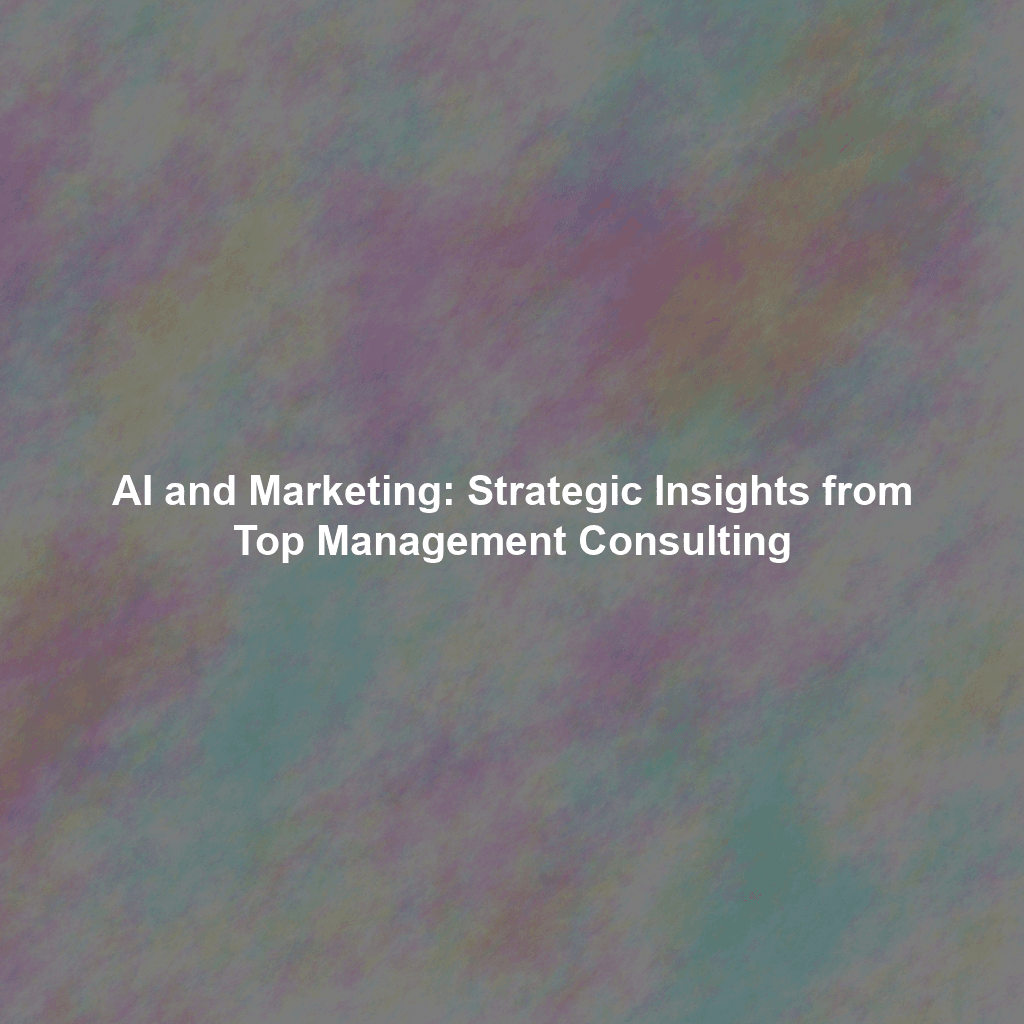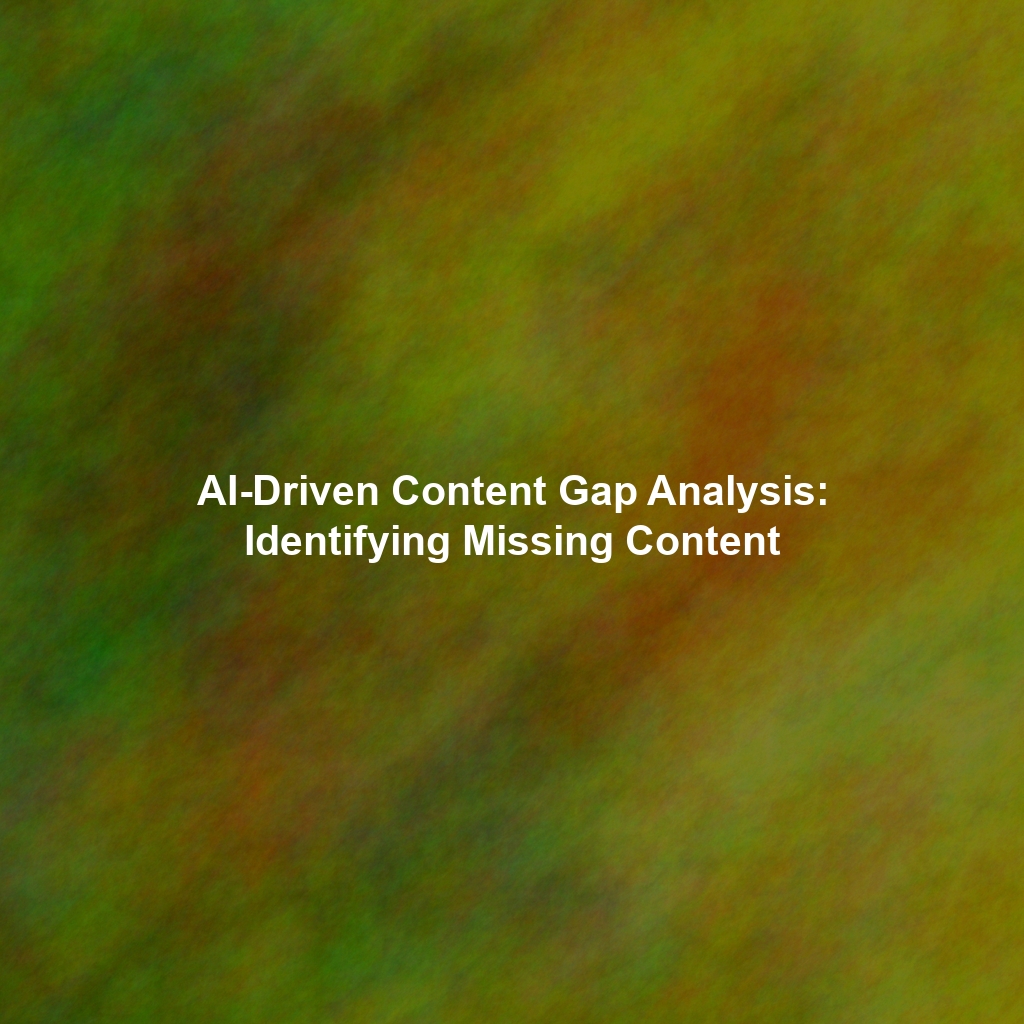Artificial Intelligence (AI) is no longer a futuristic buzzword confined to Silicon Valley labs; it’s a present-day reality, a powerful force fundamentally transforming marketing strategies and operational paradigms across every industry. Leading global management consulting firms – including titans like McKinsey & Company, Boston Consulting Group (BCG), Oliver Wyman, and Bain & Company – have extensively analyzed AI’s profound impact, providing invaluable, data-backed insights into its immense potential and practical, highest-ROI applications within the marketing domain. This comprehensive article delves deep into their collective perspectives, highlighting the most impactful and financially rewarding applications of AI in marketing today, and anticipating the transformative shifts poised to occur in the near future. It’s about moving from theoretical promise to tangible, measurable business outcomes.
STRATEGIC IMPERATIVE:
AI is reshaping the marketing landscape from a cost center to a profit driver. Understanding its strategic applications is critical for competitive advantage.
The Management Consulting Lens on AI in Marketing: A Strategic Imperative
Management consulting firms approach the integration of AI in marketing with a distinctly strategic, data-driven, and outcome-oriented mindset. Their rigorous analyses consistently focus on identifying precisely where AI can generate the most significant, measurable impact, whether that’s through boosting operational efficiency, profoundly improving customer experiences, or directly driving substantial revenue growth. Their extensive reports, whitepapers, and client engagements frequently emphasize the critical importance of adopting a holistic approach, integrating AI not merely as a standalone tool or a technological add-on, but as a fundamental, interwoven component of the overarching marketing strategy and the broader business ecosystem.
- McKinsey & Company: AI as a Digital Transformation Catalyst: Firms like McKinsey often frame AI adoption in marketing within the context of broader digital transformation initiatives. They emphasize that AI is not just about automating tasks but about fundamentally reimagining customer journeys, optimizing decision-making, and creating new value streams. Their research frequently points to the need for organizational agility and a data-first culture to truly harness AI’s power. McKinsey’s insights consistently highlight AI’s role in driving personalized customer experiences and improving marketing ROI.
- Boston Consulting Group (BCG): Data Infrastructure and Talent as Foundations: BCG consistently highlights the absolute necessity of developing robust data infrastructure and cultivating strong talent pipelines to effectively support AI implementation in marketing. They argue that without clean, accessible data and skilled professionals (data scientists, AI engineers, AI-literate marketers), AI initiatives will falter. BCG’s frameworks often focus on building AI capabilities as a core competitive advantage. BCG’s perspective often centers on actionable steps for AI adoption.
- Bain & Company: Customer Behavior at the Core: Bain emphasizes the paramount importance of deeply understanding customer behavior and preferences to effectively leverage AI’s capabilities in marketing. They advocate for using AI to gain granular insights into customer needs, predict future actions, and deliver hyper-personalized experiences that drive loyalty and lifetime value. Their approach often integrates AI with customer segmentation and journey optimization. Bain’s insights on AI often link directly to customer-centric strategies.
- Oliver Wyman: Ethical AI and Risk Management: Oliver Wyman places a strong focus on the critical risk management aspects of AI, particularly in marketing. They emphasize the importance of ensuring ethical and responsible deployment of AI solutions, addressing concerns related to data privacy, algorithmic bias, and transparency. Their analyses often guide clients in building trust and navigating regulatory complexities while leveraging AI’s power. Oliver Wyman’s view often includes a strong emphasis on responsible AI.
Across these leading firms, a consistent theme emerges: AI in marketing is not a magic bullet, but a powerful accelerant for those organizations prepared to invest strategically in data, talent, and ethical considerations, all while maintaining a clear focus on measurable business outcomes.
Highest-ROI AI Applications in Marketing Today: Proven Value Drivers
Based on the extensive insights and real-world client experiences from these top consulting firms, several AI applications are currently demonstrating compelling and quantifiable returns on investment. These are the areas where businesses are seeing tangible, positive impacts on their marketing performance right now:
Personalized Customer Experiences: Driving Engagement and Loyalty
AI-powered personalization stands out as a major area of focus and a significant value driver. McKinsey research consistently indicates that companies excelling in personalization generate 40% more revenue from those activities compared to average-performing companies. This isn’t just about addressing customers by name; it’s about delivering hyper-relevant content, offers, and interactions at every touchpoint. Key applications include:
- Personalized Recommendations: AI algorithms meticulously analyze vast amounts of customer data (browsing history, purchase patterns, demographic information) to suggest highly relevant products, services, or content. This boosts sales, increases average order value, and enhances customer engagement across e-commerce platforms, streaming services, and content sites.
- Dynamic Pricing: AI optimizes pricing strategies in real-time based on fluctuating demand, competitor pricing, customer behavior, and inventory levels. This maximizes revenue and profit margins, particularly in industries like e-commerce, travel, and hospitality.
- Personalized Email Marketing & Nurturing: AI crafts tailored email campaigns based on individual customer profiles, past interactions, and their stage in the customer journey. This leads to significantly higher open rates, click-through rates, and conversion rates compared to generic email blasts, fostering deeper relationships.
- Website & App Personalization: Dynamically changing website content, calls-to-action, and user interfaces based on individual visitor behavior and preferences, creating a bespoke experience that guides users more effectively towards conversion.
Marketing Automation and Efficiency: Streamlining Operations, Boosting Productivity
AI is fundamentally streamlining repetitive marketing processes, freeing up valuable human capital to focus on more strategic, creative, and high-impact initiatives. This translates directly into improved operational efficiency and increased productivity for marketing teams. Key applications include:
- Automated Content Generation & Curation: While not replacing human creativity, AI tools can assist in creating basic content (e.g., social media posts, product descriptions, email subject lines, ad copy variations) and curating relevant third-party content. This accelerates content velocity and ensures consistency.
- Lead Scoring and Qualification: AI algorithms analyze vast datasets of lead behavior, demographics, and firmographics to identify and prioritize the most promising leads. This dramatically improves sales team efficiency, allowing them to focus on high-potential prospects and leading to higher lead-to-opportunity and opportunity-to-win conversion rates.
- Chatbots and Virtual Assistants: AI-powered chatbots and virtual assistants provide instant, 24/7 customer support, answer frequently asked questions, guide users through processes, and resolve basic queries. This significantly enhances customer satisfaction, reduces response times, and lowers operational costs for customer service departments.
- Automated Ad Bidding & Optimization: AI algorithms manage and optimize real-time bidding for digital advertising campaigns (e.g., Google Ads, Facebook Ads), adjusting bids and targeting based on performance data to maximize ROI and achieve specific campaign goals.
Predictive Analytics for Marketing: Foresight for Proactive Strategy
AI’s unparalleled ability to analyze vast, complex datasets and identify subtle patterns to predict future trends and behaviors is invaluable for proactive marketing decision-making. This foresight allows marketers to anticipate customer needs and market shifts, enabling more effective and timely interventions. This includes:
- Customer Churn Prediction: AI models identify customers at high risk of leaving or unsubscribing based on their behavioral patterns (e.g., declining engagement, reduced purchases). This allows for proactive intervention with targeted retention efforts, special offers, or personalized outreach to save valuable customer relationships.
- Campaign Performance Prediction & Optimization: AI can predict the likely performance of different marketing campaigns (e.g., which ad creative will resonate most, which audience segment will respond best) before launch. This enables pre-emptive optimization and continuous in-flight adjustments for maximum impact and efficient resource allocation.
- Market Trend Forecasting: AI analyzes vast amounts of external data (social media trends, news, search queries, economic indicators) to identify emerging market trends, shifts in consumer preferences, and anticipate future customer needs. This allows brands to innovate proactively and stay ahead of the curve.
- Lifetime Value (LTV) Prediction: AI can predict the potential lifetime value of individual customers or segments, allowing marketers to prioritize acquisition efforts on high-LTV prospects and tailor retention strategies for their most valuable customers.
The Near Future: Emerging AI Applications Poised for Transformation in Marketing
Looking ahead, management consulting firms, alongside leading technologists, anticipate even more profound and transformative AI applications that will redefine the very fabric of marketing. These emerging areas promise to unlock unprecedented levels of personalization, creativity, and measurement precision:
- Hyper-Personalization at Scale: Moving beyond current personalization capabilities, AI will enable truly individualized experiences across all digital and physical touchpoints. This involves leveraging AI to understand each customer’s unique, real-time context (location, device, emotional state, recent interactions) and deliver highly relevant content, offers, and even interactive experiences in real-time. Imagine a website that dynamically reconfigures itself for each visitor based on their immediate needs and past behavior.
- AI-Powered Creative Development & Optimization: AI is poised to play a significantly more integral role in the creative process. This includes assisting marketers in generating innovative ideas, designing compelling visuals, and crafting persuasive copy at scale. This could involve advanced generative AI tools that can analyze vast datasets of successful advertising campaigns, identify patterns in effective creative, and then generate new, optimized variations (e.g., different headlines, image styles, video sequences) tailored for specific audience segments or campaign goals. It’s about augmenting human creativity, not replacing it.
- Enhanced Marketing Measurement and Multi-Touch Attribution: AI will revolutionize how marketers accurately measure the true impact of their campaigns and attribute conversions to specific touchpoints across increasingly complex customer journeys. By analyzing vast amounts of cross-channel data, AI can provide more precise, holistic attribution models that account for every interaction, enabling marketers to make far more informed decisions about where to strategically invest their precious resources for maximum ROI. This will move beyond simplistic last-click models to sophisticated, AI-driven insights into true channel effectiveness.
- Conversational AI for Deeper Engagement: Beyond simple chatbots, advanced conversational AI will enable more natural, human-like interactions with customers across various channels (voice, text). This will facilitate richer data collection, more nuanced problem-solving, and truly personalized sales and support experiences, blurring the lines between marketing, sales, and service.
- AI in Metaverse & Immersive Experiences: As the metaverse and immersive digital environments evolve, AI will be critical for creating personalized, interactive experiences within these spaces. This includes AI-powered avatars, dynamic content delivery in virtual worlds, and intelligent analytics for understanding user behavior in new dimensions.
Strategic Considerations for AI Adoption in Marketing: Navigating the Path to Success
While the potential benefits of AI in marketing are transformative, its successful adoption is not without its challenges. Management consulting firms consistently emphasize the importance of addressing several critical strategic considerations to ensure effective and sustainable AI implementation:
- Data Quality and Governance: AI algorithms are only as good, and as unbiased, as the data they are trained on. Ensuring data accuracy, completeness, consistency, and robust security is absolutely crucial. Organizations must establish strong data governance frameworks, implement data cleansing processes, and ensure ethical data sourcing to prevent flawed insights and biased outcomes. This is the bedrock of effective AI.
- Talent Acquisition and Development: The successful deployment and management of AI-powered marketing solutions require specialized skills. Organizations need to strategically invest in attracting, recruiting, and developing talent with expertise in data science, machine learning, AI engineering, and, crucially, marketers who are AI-literate and can effectively interpret and act on AI-generated insights. This often involves upskilling existing teams.
- Ethical Considerations & Algorithmic Bias: It’s essential to proactively address profound ethical concerns related to data privacy, potential algorithmic bias (where AI perpetuates or amplifies existing societal biases), and the need for transparency in AI decision-making. Marketers must ensure AI is deployed responsibly, fairly, and in a way that builds, rather than erodes, customer trust. AI ethics is a rapidly growing field.
- Integration with Existing Systems: AI solutions rarely operate in isolation. They need to be seamlessly integrated with existing marketing technology stacks, CRM systems, data warehouses, and other business platforms. This requires careful planning, robust APIs, and often significant IT infrastructure investment to ensure data flows smoothly and insights are actionable across the organization.
- Clear ROI Measurement & Iteration: Define clear KPIs and a robust framework for measuring the ROI of AI initiatives. Start with pilot programs, learn from the results, and iterate. AI adoption is an ongoing journey of experimentation and refinement, not a one-time deployment.
Navigating these strategic considerations effectively will determine whether an organization merely experiments with AI or truly transforms its marketing capabilities for competitive advantage.
Conclusion: AI – The Future of Marketing, Guided by Strategic Vision
Artificial Intelligence is rapidly and fundamentally reshaping the marketing landscape, offering unprecedented opportunities for hyper-personalization, intelligent automation, and precise predictive capabilities. By diligently understanding the strategic insights and practical frameworks provided by top management consulting firms like McKinsey, BCG, Bain, and Oliver Wyman, marketers can accurately identify the highest-ROI applications of AI and develop robust, effective strategies for its responsible adoption. While significant challenges related to data, talent, and ethics undoubtedly exist, the potential benefits and competitive advantages offered by AI in marketing are simply too significant to ignore.
As AI technology continues its relentless evolution, those organizations that embrace it strategically, invest in the necessary foundations, and commit to continuous learning and ethical deployment will be unequivocally best positioned to thrive, innovate, and lead in the dynamic and increasingly intelligent future of marketing. It’s not about if, but *how* you integrate AI into your core marketing strategy.
 Skip to content
Skip to content

